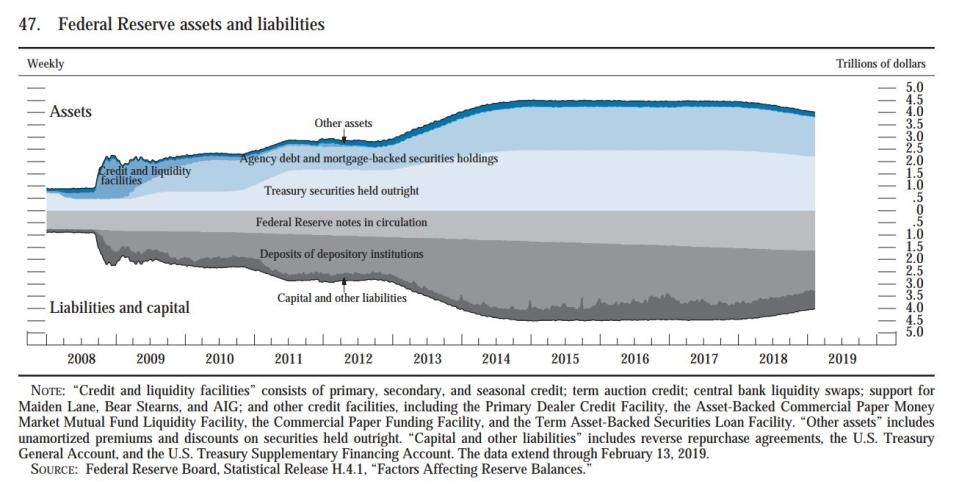Powell signals that balance sheet rolloff could end as early as October
Federal Reserve Chairman Jerome Powell’s testimony to Congress Tuesday yielded little new information on the Fed’s path of monetary policy, but Powell may have given markets a clue on where the Fed might halt its efforts to shrink its balance sheet.
Powell told the Senate Banking Committee Tuesday that the Fed will likely stop its balance sheet normalization process at a point where banks’ demand for reserves is about $1 trillion. In response to a question from Sen. Mike Crapo (R-Idaho), Powell said reserves — the measure of how much money a bank parks at the Fed — is a guidepost on determining the final size of the balance sheet.
“We don’t have a precise notion, but we believe that the public estimates that are out there of around a trillion dollars, plus a buffer — as you mention in your remarks — is a reasonable starting point and estimate of where we might wind up,” Powell said. Bank reserves are currently at about $1.6 trillion, as of the most recent reading in mid-February.
When will the balance sheet unwind end?
Powell’s $1 trillion figure — which refers to only bank reserves and not the entire balance sheet — has some guessing that the Fed could complete its balance sheet unwind process as early as this October and as late as this December. Bloomberg Senior U.S. Economist Yelena Shulyatyeva wrote Tuesday that near the $1 trillion figure, the ultimate balance sheet would be around $3.6 trillion to $3.7 trillion when the unwind ends.
The Fed’s balance sheet is currently about $4 trillion. At a roll-off pace of $50 billion per month, that would mean the Fed could stop in seven to nine months, according to Yahoo Finance calculations. This would place the end date of the balance sheet unwind somewhere between October and December of this year.
After the Fed released minutes from the January policy-setting meeting, JPMorgan Chase’s Michael Feroli similarly noted that it could see terminal reserves around $1.15 trillion, which reflects the “buffer.” At this level it would similarly imply an overall balance sheet of about $3.75 trillion and an October or November timeframe for stabilizing balance sheet levels.
All of these predictions fall in line with some Fed officials who have publicly stated support for ending the program by the end of 2019.

Bank appetite?
The Fed is using bank reserves as its guiding star because policymakers want to make sure they don’t lose control over the level of the federal funds rate. If the Fed were to operate on a balance sheet that’s too small, market forces over short-term interest rates could swing out of control and force the central bank to toy with the supply of reserves to rein in interest rates.
The Fed has said they would prefer having a balance sheet large enough where that type of active management is not required, an operating procedure known as the “floor system” within central banking circles.
In short, the Fed wants to make sure the balance sheet matches bank appetite for reserves parked at the Fed. Powell points out that banks’ appetite should be higher than it was before the financial crisis, partially because of post-crisis regulations requiring banks to hold higher levels of high-quality liquid assets. Banks can meet these requirements by keeping more money deposited at the Fed.
“The demand for reserves is going to be very substantially higher than it was before the crisis and will not go back to those lower levels,” Powell said.
The Fed said that at some point it will communicate its plans on wrapping up the balance sheet unwind. The January meeting minutes noted that nearly all members of the Federal Open Market Committee supported announcing those plans “before too long” and ultimately stopping the process “later this year.”
Brian Cheung is a reporter covering the banking industry and the intersection of finance and policy for Yahoo Finance. You can follow him on Twitter @bcheungz.
Read more:
Fed Chair Powell: We're seeing 'crosscurrents and conflicting signals'
Three-fourths of business economists expect a recession by 2021, survey finds
Fed officials acknowledge concerns over balance sheet normalization
Fed officials not 'complacent' with inflationary pressures
Congress may have accidentally freed nearly all banks from the Volcker Rule
